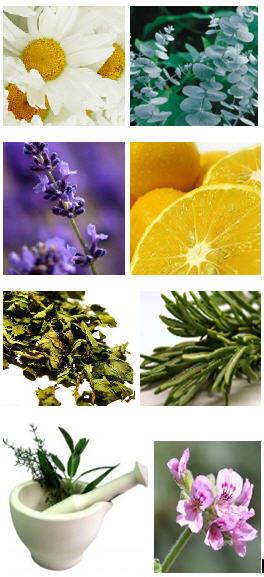Dr Bach’s Rescue Remedy
This is a ready-made mixture of the homeopathic flower tinctures of cherry plum, clematis, impatiens, rock rose, and star of Bethlehem. The tincture is useful in many minor or major situations where there is shock and nerves need to be calmed. Take four drops at a time under the tongue. Use as often as every 15 minutes if the situation warrants it. It can be rubbed on the pulse points if the patient is unconscious.

Essential oils
• Chamomile essential oil to calm tension, depression and anxiety, insomnia, internal inflammation such as gastritis, diarrhea, cystitis, menstrual pain, PMS (external treatments), and also to ease dull pain.
• Eucalyptus essential oil – it is anti-inflammatory, antiseptic, antiviral and pain relieving.
• Geranium essential oil to use with lemon essential oil and witch hazel to stop bleeding. Nerve tonic when stressed. Use with lavender essential oil to repel insects.
• Ginger essential oil for nausea, muscular pain, and fatigue.
• Grapefruit essential oil to combat fatigue, depression, and nervous exhaustion. Blend with geranium to counteract muscle stiffness.
• Lavender essential oil may be used undiluted over small areas. Mix with witch hazel for insect bites, insect repellent, bruises, minor burns, and sunburn. Also for headaches, depression
• Lemon essential oil – use with geranium essential oil and witch hazel to stop bleeding and prevent bacterial infection of wounds. One drop of oil in a cup of water is reputed to make the water safe to drink but I would hesitate to recommend this in Third World countries or whenever you are off the beaten track and unsure of the water supply.
• Peppermint and/or ginger essential oils – ease stomach cramps, travel sickness, and nausea. Caution – use 0.5 percent only of ginger and peppermint essential oils.
• Rosemary essential oil stimulates the central nervous system (and therefore the brain), gives clarity to the brain, and inhalations ease the symptoms of colds, coughs, catarrh. Eases the pain of muscles that are tired and stiff from sitting for long periods. Caution – not to be used by epileptics or during pregnancy.
• Tea tree essential oil – antibacterial, antiviral, antiseptic, antifungal. Maybe used undiluted over small areas. Use to treat abscesses, athlete’s foot, cold sores, cuts, grazes, bites, ringworm, and sunburn.
• Witch hazel extract to reduce the pain of bites and stings as well as inflammation.
Garlic oil capsules
Garlic oil contains a very powerful antibacterial agent called allicin, which prevents the growth of bacteria and also promotes the healing of infections. This makes it an ideal preventative herb.
Ipecac (ipecacuanha) syrup
This Brazilian herb, used in small doses, is an expectorant and in large doses becomes an emetic. Its main use in the first-aid box is in cases of poisoning. It must never be used if a strong corrosive liquid or a substance with strong fumes has been swallowed, or if the patent is an infant under one year old. Always follow the instructions on the manufacturer’s label.
In cases of child poisoning, it is always best to obtain urgent medical advice before you administer any remedy. Your doctor, ambulance service, health service, or if you have one, poisons information center or equivalent service, will usually give advice over the phone on what to take, according to what has been swallowed.
Menthol crystals
Menthol is crystallized out of peppermint oil. In the first-aid box it is used for an inhalation.
Ointments
Basic healing ointment
Slippery elm
The powdered bark of this tree from North America is a specific treatment for soothing inflamed membranes, both internally and externally. Follow the instructions on the container.
Tinctures
Some of the tinctures you will find useful are calendula, chamomile, cayenne, ginger, and shepherd’s purse. Distilled witch hazel is a must, as this tincture is one of the finest and gentlest astringents there is. It is available from pharmacies.
Nosebleeds are common in some kids and you should be ready at any time to deal with them.
In your Fist-Aid Box, you also need:
• Bandages, slings, clean cloth
• Plasters, eye patches
• Scissors, tweezers
• Steel or enamel dish
• Small funnel
• Thermometer
• Two or three eye-droppers
• Glass or plastic 25 ml medicine measure
• Cotton buds and absorbent cotton (cotton wool)
• Two empty dropper bottles for mixing
• Two eye droppers for measuring essential oils
• Paddle pop sticks for taking ointment out of jar
• 15 ml bottle sweet almond oil for making blends

